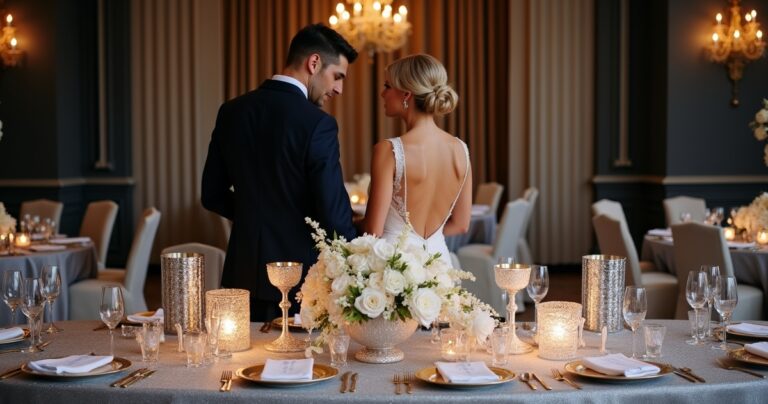Planning a wedding can be an overwhelming task, but hiring a wedding planner can make the process smoother and more enjoyable. In this guide, we’ll explore everything you need to know about wedding planners, from their roles and responsibilities to how to choose the right one for your special day.
What is a Wedding Planner?
A wedding planner is a professional who assists couples in organizing and managing their wedding day. They handle various tasks, from venue selection to coordinating with vendors, ensuring that every detail is perfect.
Roles and Responsibilities
Wedding planners take on numerous roles to ensure a seamless wedding experience. They are responsible for budgeting, scheduling, and coordinating all aspects of the wedding. Their expertise allows them to handle unexpected issues, ensuring that the couple can enjoy their day without stress.
- Budget management
- Vendor coordination
- Timeline creation
- Problem-solving on the day of the event
Types of Wedding Planners
There are different types of wedding planners, each offering unique services. Full-service planners handle every detail from start to finish, while day-of coordinators focus on managing the wedding day itself. Partial planners offer a mix of both, assisting with specific tasks as needed.
- Full-service planners
- Day-of coordinators
- Partial planners
Benefits of Hiring a Wedding Planner
Hiring a wedding planner can save time, reduce stress, and ensure a well-organized event. According to Brides.com, 96% of couples who used a wedding planner reported reduced stress levels. Planners bring expertise and industry connections, which can lead to cost savings and a more polished event.
- Time-saving
- Stress reduction
- Access to industry connections
- Cost-effective solutions
How to Choose the Right Wedding Planner
Selecting the right wedding planner is crucial for a successful event. Consider their experience, communication style, and budget compatibility to find the perfect match for your needs.
Experience and Expertise
A wedding planner’s experience and expertise are vital. Look for planners with a proven track record and positive reviews. Experienced planners are better equipped to handle unexpected challenges and provide creative solutions.
- Proven track record
- Positive client reviews
- Creative problem-solving skills
Communication Style
Effective communication is key to a successful partnership with your wedding planner. Choose someone who listens to your ideas and communicates clearly. A planner who understands your vision will help bring your dream wedding to life.
- Active listening
- Clear communication
- Understanding of your vision
Budget Considerations
Budget is a significant factor when choosing a wedding planner. Ensure that their fees align with your budget and that they can work within your financial constraints. A good planner will help you allocate funds wisely and find cost-effective solutions.
- Fee alignment with budget
- Financial constraint management
- Cost-effective solutions
References and Reviews
Check references and reviews to gauge a planner’s reliability and professionalism. Speak with past clients to learn about their experiences and satisfaction levels. Online reviews can also provide valuable insights into a planner’s reputation.
- Client testimonials
- Online reviews
- Professional reputation
Wedding Planning Tools and Resources
Utilizing wedding planning tools and resources can simplify the planning process. From online platforms to apps and books, these resources offer valuable assistance.
Online Wedding Planning Platforms
Online platforms like The Knot and WeddingWire offer comprehensive planning tools. They provide checklists, vendor directories, and budgeting tools to help you stay organized and on track.
- The Knot
- WeddingWire
- Comprehensive planning tools
Wedding Planning Apps
Wedding planning apps offer convenience and accessibility. Apps like Zola and WeddingHappy allow you to manage tasks, track RSVPs, and communicate with vendors on the go.
- Zola
- WeddingHappy
- Task management and vendor communication
Wedding Planner Books and Journals
Books and journals provide inspiration and guidance for planning your wedding. They offer tips, checklists, and creative ideas to help you personalize your event.
- Inspiration and guidance
- Checklists and creative ideas
- Personalization tips
DIY Wedding Planning vs. Professional Wedding Planners
Deciding between DIY planning and hiring a professional involves weighing the pros and cons of each approach.
Pros and Cons of DIY Planning
DIY planning offers flexibility and cost savings but can be time-consuming and stressful. It requires strong organizational skills and the ability to manage multiple tasks simultaneously.
- Flexibility and cost savings
- Time-consuming and stressful
- Requires strong organizational skills
When to Consider Hiring a Professional
Consider hiring a professional if you lack the time, expertise, or desire to manage the planning process. A wedding planner can alleviate stress and ensure a well-executed event.
- Lack of time or expertise
- Desire for stress-free planning
- Well-executed event assurance
Wedding Planner Timelines and Checklists
Timelines and checklists are essential for staying organized and ensuring that no detail is overlooked.
12-Month Wedding Planning Timeline
A 12-month timeline provides a comprehensive overview of tasks to complete leading up to the wedding. It includes booking vendors, sending invitations, and finalizing details.
- Booking vendors
- Sending invitations
- Finalizing details
6-Month Wedding Planning Timeline
A 6-month timeline focuses on final preparations and confirmations. It includes tasks like dress fittings, menu tastings, and seating arrangements.
- Dress fittings
- Menu tastings
- Seating arrangements
Month-of Wedding Planning Checklist
A month-of checklist ensures that all last-minute details are addressed. It includes confirming vendor arrangements, creating a day-of schedule, and packing for the honeymoon.
- Confirming vendor arrangements
- Creating a day-of schedule
- Packing for the honeymoon
How much does a wedding planner cost?
Understanding the cost of hiring a wedding planner is essential for budgeting purposes.
Average Wedding Planner Fees
The average cost of a wedding planner in the US ranges from $1,500 to $3,000, according to WeddingWire. Fees vary based on the planner’s experience, location, and services offered.
- $1,500 to $3,000 average cost
- Varies by experience and location
- Service offerings impact fees
Factors Affecting Wedding Planner Costs
Several factors influence wedding planner costs, including the complexity of the event, the planner’s reputation, and the level of service required. Customization and additional services may also affect pricing.
- Event complexity
- Planner’s reputation
- Level of service required
Cost-Saving Tips for Wedding Planning
To save on wedding planning costs, consider booking a planner early, opting for a partial planning package, or negotiating service fees. Utilizing online resources and DIY elements can also reduce expenses.
- Book early
- Opt for partial planning
- Negotiate service fees
What should I ask a wedding planner before hiring?
Asking the right questions before hiring a wedding planner ensures that you find the best fit for your needs.
Experience and Qualifications
Inquire about the planner’s experience and qualifications. Ask about their background, certifications, and the types of weddings they have planned.
- Background and certifications
- Types of weddings planned
- Experience level
Services Offered
Understand the range of services offered by the planner. Determine if they provide full-service planning, day-of coordination, or specific task assistance.
- Full-service planning
- Day-of coordination
- Specific task assistance
Availability and Commitment
Confirm the planner’s availability and commitment to your wedding date. Ensure they can dedicate the necessary time and resources to your event.
- Availability on wedding date
- Time and resource dedication
- Commitment level
How do I create a wedding planning timeline?
Creating a wedding planning timeline involves setting key milestones and customizing the schedule to fit your needs.
Key Milestones in Wedding Planning
Identify key milestones such as booking the venue, sending invitations, and finalizing the guest list. These milestones help structure the planning process and ensure timely completion of tasks.
- Booking the venue
- Sending invitations
- Finalizing the guest list
Customizing Your Timeline
Customize your timeline based on your wedding date, preferences, and priorities. Adjust the schedule to accommodate any unique elements or personal touches you wish to include.
- Adjust for wedding date
- Incorporate personal touches
- Prioritize tasks
Using Digital Tools for Timeline Management
Digital tools like Trello and Asana can help manage your wedding planning timeline. These tools offer task tracking, deadline reminders, and collaboration features.
- Trello
- Asana
- Task tracking and collaboration
What are the most important aspects of wedding planning?
Focusing on key aspects of wedding planning ensures a successful and memorable event.
Setting a Budget
Setting a realistic budget is crucial for managing expenses and avoiding financial stress. Allocate funds for each aspect of the wedding and track spending to stay within budget.
- Realistic budget setting
- Expense management
- Spending tracking
Choosing a Venue
Selecting the right venue sets the tone for your wedding. Consider factors like location, capacity, and style to find a venue that aligns with your vision.
- Location and capacity
- Style and ambiance
- Vision alignment
Creating a Guest List
Creating a guest list involves deciding who to invite and managing RSVPs. Consider your budget, venue capacity, and personal relationships when finalizing the list.
- Invitation decisions
- RSVP management
- Budget and capacity considerations
How can I make my wedding unique?
Incorporating unique elements into your wedding can make it memorable and personal.
Personalized Wedding Themes
Choose a personalized wedding theme that reflects your personality and style. Themes can range from rustic and vintage to modern and elegant.
- Reflects personality and style
- Rustic, vintage, modern themes
- Elegant and unique
Incorporating Cultural Elements
Incorporate cultural elements to honor your heritage and traditions. This can include traditional attire, ceremonies, or cuisine.
- Honor heritage and traditions
- Traditional attire and ceremonies
- Cultural cuisine
Unique Wedding Entertainment Ideas
Consider unique entertainment options to surprise and delight your guests. Options include live bands, interactive photo booths, or themed performances.
- Live bands and performances
- Interactive photo booths
- Themed entertainment
FAQs
What is the difference between a wedding planner and a wedding coordinator?
A wedding planner is involved in the entire planning process, from start to finish, while a wedding coordinator focuses on managing the wedding day itself. Planners handle budgeting, vendor selection, and overall organization, whereas coordinators ensure the day runs smoothly.
How far in advance should I hire a wedding planner?
It’s recommended to hire a wedding planner 12 to 18 months before your wedding date. This allows ample time for planning, vendor selection, and addressing any unforeseen challenges. Early hiring also increases the likelihood of securing your preferred planner.
Can a wedding planner help with destination weddings?
Yes, many wedding planners specialize in destination weddings. They can assist with logistics, travel arrangements, and local vendor coordination. Their expertise ensures a seamless experience, even when planning from afar.







